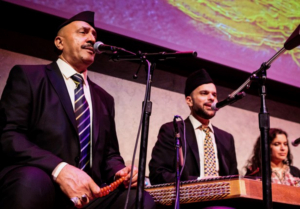Famed Iraqi Vocal Master HAMID AL-SAADI w. SAFAAFIR at Roulette

The Iraqi maqam (modal system), one of Iraq's richest cultural offerings, features sophisticated melodies, infectious rhythms, and eloquent poetry. Hamid Al-Saadi, Iraq's foremost exponent of this centuries-old tradition, is renowned for his powerful voice and highly ornamented style, as well as his comprehensive knowledge of the intricate details of the music and poetry of Iraq. Al-Saadi is the only person from his generation to have memorized and mastered all 56 maqamat from the Baghdad repertoire, and is one of the few vocalists to keep this maqam alive today. He is joined by Safaafir, the only US-based ensemble dedicated to performing the Iraqi maqam in it traditional format. The group is led by the acclaimed Amir ElSaffar (santur-zither) and Dena El Saffar (joza-bowed stringed instrument, violin) of Iraqi descent, and features Tim Moore on percussion.
Hamid Al-Saadi's artistic, musical and scholarly journey with the Iraqi maqam began from childhood, inspired by his avid love of the Iraqi and Baghdadi culture, the Arabic language, music and poetry. Born in Iraq in 1958, he learned the art of singing and performing the Iraqi maqam from the legendary Yusuf Omar (1918-1987), who pronounced Al-Saadi as his successor. Muhammed Al-Gubbenchi (1901-1989) who taught Omar and was probably the most influential maqam reciter in history, said that he considered Al-Saadi to be the "ideal link to pass on the maqam to future generations." Al-Saadi immigrated to Great Britain in 1999, where he was active for six years as a maqam scholar, singer, artist and writer, and returned to Baghdad in 2004. He authored a book on the maqam entitled "al-maqam wo buhoor al-angham," which is one of the most comprehensive texts on the Iraqi maqam and its poetry ever published. His tours of the US included performances at New York's St. John the Divine, The Old Town School of Folk Music in Chicago, Duke University, the Kennedy Center Jazz Club, and the David Rubenstein Atrium at Lincoln Center.
Safaafir, meaning "coppersmiths," was named in homage to Amir ElSaffar and Dena El Saffar's ancestry and namesake (Saffar translates from Arabic to "coppersmith"). Both siblings have backgrounds in Western music, but eventually found their way into Iraqi music. For the past five years, Safaafir has performed for Iraqi, Arab and American audiences across the US and internationally.
Amir ElSaffar is a lauded jazz trumpeter - "one of the most promising figures in jazz today" (Chicago Tribune) and "uniquely poised to reconcile jazz and Arabic music" (The Wire) - based in New York City, as well as a purveyor of the now-endangered centuries-old Iraqi maqam tradition, which he performs actively as a vocalist and santur payer. As a composer, he has used the subtle microtones found in Iraqi maqam music to create an innovative approach to harmony and melody, and has received commissions to compose for large and small jazz ensembles, traditional Middle Eastern ensembles, chamber orchestras, string quartets, and contemporary music ensembles, as well as dance troupes. Born near Chicago near 1977 to an Iraqi immigrant father and an American mother, he earned a BA in classical trumpet from DePaul University while playing in Chicago's jazz scene. He moved to New York in 2000 and played in the ensembles of Cecil Taylor, Vijay Iyer, and Rudresh Mahanthappa. In 2002, he embarked on a journey to Baghdad and throughout the Middle East to study the Iraqi maqam; his main teacher during this period was vocalist Hamid Al-Saadi. Upon returning to New York five year later, he established himself with his work combining jazz and Middle Eastern music. He has released seven albums, leads several ensembles (the 17-piece Rivers of Sound Orchestra, Two Rivers, the Amir ElSaffar Quintet, and Safaafir), and received commissions from the Berlin Jazz Festival, the Newport Jazz Festival, the Flamenco Biennale, the Metropolitan Museum of Art, and Chamber Music America.
Dena El Saffar, multi-instrumentalist, composer, and teacher, was born and raised in a musical family in Chicago. She began violin lessons at six, and at the age of 17, after winning several concerto competitions and touring Europe with a youth orchestra, travelled to Iraq and became inspired to learn Iraqi music traditions. After completing a Viola Performance degree at the Indiana University Jacobs School of Music, she made Bloomington her home. While a student, she founded the Middle Eastern music group Salaam, which recorded seven albums. She plays several traditional Middle Eastern instruments - oud, joza, keamche - as well as violin and viola, and has toured and performed with Youssou N'Dour, the Rivers of Sound Orchestra, the National Arab Orchestra, and Safaafir.
Tim Moore began playing drums at the age of 11. He devoted himself fully to music in 1993, learning rhythms and instruments from around the world, eventually bringing his focus to Middle Eastern percussion He has studied Arabic percussion with Wessam Ayoub, Sattar Al Saadi, Lateef Al'Abeedi, N. Scott Robinson, and Mohammed Khalil Salih. He plays the dumbek, riqq, naggarat, bendir, tabl and zanbu, as well as drum set, bass and guitar.
Made possible in part with public funding provided by the National Endowment for the Arts and the New York State Council on the Arts with the support of Governor Andrew Cuomo and the New York State legislature.
Upcoming concert of music of the Arab world at Roulette:
A Night in Arabia - Music of Yemen & Oman: Abdulrahman Al-Akhfash with Zafir Tawil / Amal Waqar with Tareq Rantisi (Apr 4)
Comments
Videos

